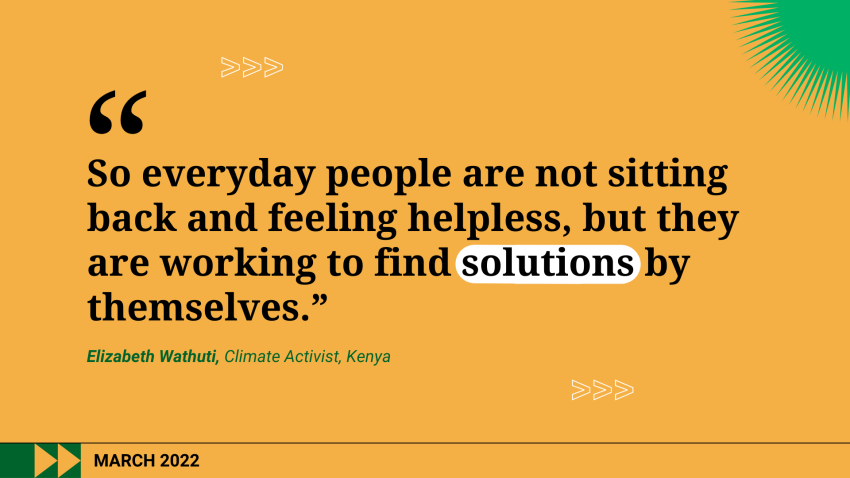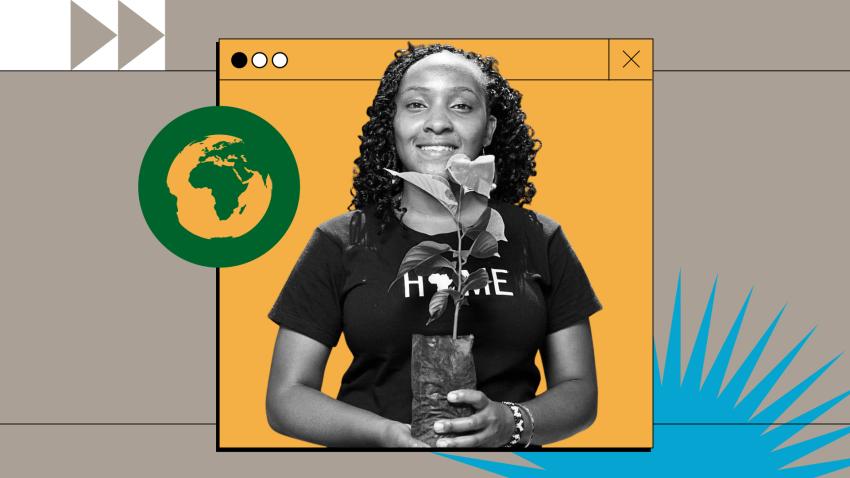Elizabeth Wathuti, a Green Climate Fund Youth Champion, and the founder of the Green Generation Initiative, calls for solidarity and compassion in our efforts to address the world’s growing climate and ecological crises.
Kenyan climate activist Elizabeth Wathuti’s powerful words at the UN Climate Change Conference in Glasgow in 2021 calling global leaders to open their hearts to those suffering the devastating impacts of climate change resonated deeply with the world. As she stood in front of thousands of participants, many with the power and resources to act, she spoke of the harsh realities facing over 2 million Kenyans who do not have enough to eat due to deforestation and climate change-induced disasters like droughts and floods.

“Most of the things that are happening in the world right now are because we have chosen to put profits above the people and our planet.”
“But if we can get everybody around the world to love nature, to appreciate nature, and to make sure that we are doing this from deep within our hearts and deep within ourselves, then we can change so much in the world within a short period of time,” she says.
Elizabeth grew up in one of the most forested regions in Kenya. Africa is home to close to a fifth of the world’s forests but every year, deforestation destroys nearly 3 million hectares of the continent’s forest. Today, the growing impacts of climate change are making it harder to reverse forest loss and land degradation across the continent and the world.
“The natural world that my friends and I knew as children began to change before our eyes. The streams are no longer flowing at the same fast speed and also the trees that we had planted as children at some point - I remember walking into this beautiful forest, and finding tree logs and tree stumps instead of mighty trees. Because back then when we're planting trees as children, we expected that it would come back. In the next years, you'd find a beautiful forest but then it looked like people did not really care so much about this beautiful forest.”

Forests absorb a third of the global carbon dioxide emissions warming the planet. They combat climate change, buffer the impacts of storms and floods, and provide food, water, shelter and jobs for many communities. But we are losing 12 million hectares of forest every year due to deforestation - one of the biggest sources of global emissions.
Eliminating emissions from deforestation and increasing carbon removals by promoting forest regrowth and landscape restoration could reduce global net emissions by up to 30 per cent, and over the next decade, forests could provide as much as 50 per cent of the cost-effective mitigation available.

Elizabeth founded the Green Generation Initiative in 2016 - a youth-led initiative aimed at addressing environmental issues through education, tree growing for impact, advocacy, and activism. She was determined to empower communities, particularly children and young people, to find solutions to the climate and ecological crisis.
“This is about humanity's future. This is about making sure that the world right now is liveable.”
If our actions are not truly genuine, then we are not going to be doing any justice to the people that are impacted by the crisis right now. And we are not going to be doing any justice to the children and the people whose lives and livelihoods depend on the decisions that are being made right now,” says Elixabeth.
At the Climate Change Conference in Glasgow, 141 countries agreed to halt, and reverse forest loss and land degradation by 2030. The pledge, which includes $19.2 billion of funding, is a landmark move for nature. Now, the world has to turn the commitments into actions.

“The African continent is not only the most impacted by the climate crisis, but it's also the continent where you find most of these solutions happening on the ground and being led by youths, by women groups, that are still impacted by the crisis.”
“So everyday people are not sitting back and feeling helpless, but they are working to find solutions by themselves.”
“The best thing that the world can do is to help tap on some of these solutions, scale them up and make sure that these are the stories that are being told out there - stories of resilience but also stories to let the world know that we are doing the best we can now [and] we need everyone else to do what they're supposed to know. We need the word leaders, who have all the resources, all the capacity and everything that they would need to do much more than people on the ground are doing to also step up and do the best they can, and step up and do what must be done,” she adds.
The benefits of forest conservation and restoration are countless. Forests provide a range of crucial ecosystem services, without which life on our planet would be impossible, says the UN Environment Programme. They also host the biodiversity that underpins these services. The services provided by forests include climate change mitigation, water regulation, cultural benefits, and production of food, fuel and fibre.

Moreover, the potential gains are enormous. By investing $30 billion in fighting deforestation, we can earn a return of $2.5 trillion in saved products and services. Targeted investments in forestry can also generate up to millions of jobs.
“If we are going to achieve everything, we will need everyone on board.”
“What I think needs to happen is that the people who truly understand why this work is really important, need to also continue putting up so much pressure on everyone. We even need more climate activists on board, we need more people who care and are concerned about the planet to join this movement and make sure that we are holding everyone accountable, because this is also about system change. This is also about individual responsibility,” she stresses.
“It's not easy to get someone to take action. That ability and the will to act has to come from deep within us so that we can do what must be done and we need to know how to get people and how to move people to actually take action. And if we get a majority of people who actually understand and feel it themselves, then we are the people that are also going to move the leaders to take action.”
“That kind of people power is what is going to make the huge and real difference in the world today.”




